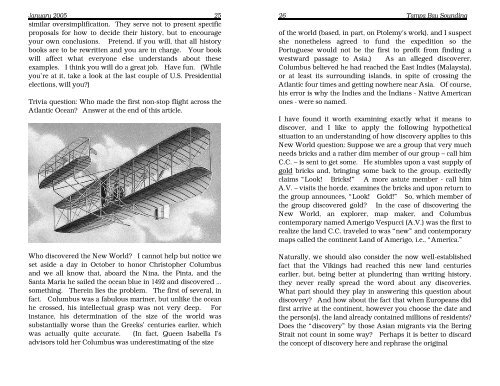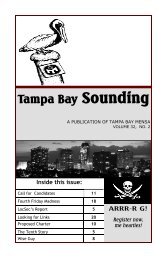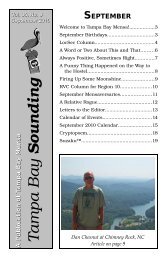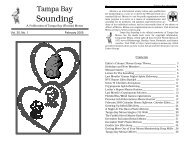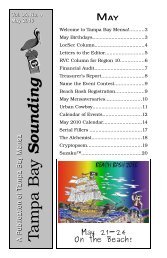Create successful ePaper yourself
Turn your PDF publications into a flip-book with our unique Google optimized e-Paper software.
<strong>January</strong> <strong>2005</strong> 25<br />
similar oversimplification. They serve not to present specific<br />
proposals for how to decide their history, but to encourage<br />
your own conclusions. Pretend, if you will, that all history<br />
books are to be rewritten and you are in charge. Your book<br />
will affect what everyone else understands about these<br />
examples. I think you will do a great job. Have fun. (While<br />
you’re at it, take a look at the last couple of U.S. Presidential<br />
elections, will you)<br />
Trivia question: Who made the first non-stop flight across the<br />
Atlantic Ocean Answer at the end of this article.<br />
Who discovered the New World I cannot help but notice we<br />
set aside a day in October to honor Christopher Columbus<br />
and we all know that, aboard the Nina, the Pinta, and the<br />
Santa Maria he sailed the ocean blue in 1492 and discovered ...<br />
something. Therein lies the problem. The first of several, in<br />
fact. Columbus was a fabulous mariner, but unlike the ocean<br />
he crossed, his intellectual grasp was not very deep. For<br />
instance, his determination of the size of the world was<br />
substantially worse than the Greeks’ centuries earlier, which<br />
was actually quite accurate. (In fact, Queen Isabella I's<br />
advisors told her Columbus was underestimating of the size<br />
26 <strong>Tampa</strong> <strong>Bay</strong> Sounding<br />
of the world (based, in part, on Ptolemy's work), and I suspect<br />
she nonetheless agreed to fund the expedition so the<br />
Portuguese would not be the first to profit from finding a<br />
westward passage to Asia.) As an alleged discoverer,<br />
Columbus believed he had reached the East Indies (Malaysia),<br />
or at least its surrounding islands, in spite of crossing the<br />
Atlantic four times and getting nowhere near Asia. Of course,<br />
his error is why the Indies and the Indians - Native American<br />
ones - were so named.<br />
I have found it worth examining exactly what it means to<br />
discover, and I like to apply the following hypothetical<br />
situation to an understanding of how discovery applies to this<br />
New World question: Suppose we are a group that very much<br />
needs bricks and a rather dim member of our group – call him<br />
C.C. – is sent to get some. He stumbles upon a vast supply of<br />
gold bricks and, bringing some back to the group, excitedly<br />
claims “Look! Bricks!” A more astute member - call him<br />
A.V. – visits the horde, examines the bricks and upon return to<br />
the group announces, “Look! Gold!” So, which member of<br />
the group discovered gold In the case of discovering the<br />
New World, an explorer, map maker, and Columbus<br />
contemporary named Amerigo Vespucci (A.V.) was the first to<br />
realize the land C.C. traveled to was “new” and contemporary<br />
maps called the continent Land of Amerigo, i.e., “America.”<br />
Naturally, we should also consider the now well-established<br />
fact that the Vikings had reached this new land centuries<br />
earlier, but, being better at plundering than writing history,<br />
they never really spread the word about any discoveries.<br />
What part should they play in answering this question about<br />
discovery And how about the fact that when Europeans did<br />
first arrive at the continent, however you choose the date and<br />
the person(s), the land already contained millions of residents<br />
Does the “discovery” by those Asian migrants via the Bering<br />
Strait not count in some way Perhaps it is better to discard<br />
the concept of discovery here and rephrase the original


